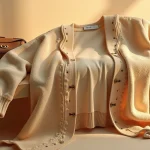The Growing Influence of Sustainable Fashion in the UK
Sustainable fashion UK has become increasingly significant in shaping women’s style choices across diverse demographics. Awareness of environmental issues combined with ethical concerns drives many UK women to prioritize eco-friendly clothing options. This rising consciousness manifests not just as a niche preference but as a substantial shift in overall UK fashion trends.
Adoption trends reveal a marked increase in demand for sustainable brands, with many women seeking out labels that embody transparency and responsibility in production. Early statistics demonstrate that a growing percentage of female shoppers in the UK favor garments made from organic or recycled materials, reflecting a deliberate move away from fast fashion.
In parallel : Explore stylish blue beret hats for every occasion
This shift in attitudes aligns closely with concerns about climate change and human rights, which increasingly influence purchasing behavior. Women not only select clothing based on style but also evaluate the ethical footprint associated with their choices. As sustainable fashion UK gains momentum, it encourages continued integration of eco-conscious principles into everyday wardrobes, redefining what modern UK women’s style looks like.
Defining Sustainable Fashion and Its Core Principles
Sustainable fashion UK embodies a commitment to sustainability principles that prioritize ethical fashion practices and the use of eco-friendly materials. In the UK, this means reducing environmental harm through choices such as sourcing organic cotton, recycled fabrics, and minimizing water waste during production. Transparency in supply chains is a key element, ensuring that brands disclose the origins and manufacturing conditions of their garments.
Have you seen this : Elevate your wardrobe with the gucci cardigan at $424
Ethical fashion within sustainable fashion UK emphasizes fair labor practices, avoiding exploitation, and supporting workers’ rights throughout the production process. Brands adhering to these principles often implement certifications and audits to maintain integrity. This framework helps UK consumers make informed decisions aligned with their values.
Additionally, sustainable fashion UK integrates durability and timeless design, encouraging consumers to invest in pieces meant to last rather than follow fleeting trends. This shift challenges the fast fashion model prevalent in UK fashion trends, fostering a more responsible approach to style.
By adhering to core sustainability principles, sustainable fashion UK not only addresses environmental concerns but also promotes a holistic ethical standard that resonates with the growing eco-conscious mindset among women’s style choices today.
The Growing Influence of Sustainable Fashion in the UK
Sustainable fashion UK is reshaping women’s style choices by embedding eco-consciousness into everyday wardrobes. Increasingly, UK women are seeking brands that align with their values, reflecting a shift in UK fashion trends from fast fashion to more responsible consumption. This change is driven by a desire to support transparency, sustainability, and ethical labour practices.
Adoption trends indicate a steady rise in demand for eco-friendly clothing options. Women prefer garments made from recycled or organic materials, proving that sustainable fashion UK appeals not only to niche groups but to a broader demographic. Early statistics reveal that a significant percentage of female shoppers now prioritise sustainability when selecting clothing, signalling a lasting impact on UK fashion trends.
Such choices represent an intentional move to embrace slow fashion, encouraging quality over quantity. This trend influences how UK women build their wardrobes by favouring versatile and durable pieces that offer both style and sustainability. Ultimately, sustainable fashion UK empowers women to express individuality while making responsible choices aligned with their ethical concerns.
The Growing Influence of Sustainable Fashion in the UK
Sustainable fashion UK is reshaping women’s style choices by aligning beauty with responsibility. UK women increasingly seek garments with transparent origins and eco-conscious production. Early data show a clear trend: a rising proportion of female shoppers prioritizes brands committed to sustainability principles, moving away from fast fashion’s disposability.
Adoption trends reflect both ethical concern and practical style. Women incorporate eco-friendly clothing into everyday wear, favoring pieces crafted from organic or recycled materials. This shift influences broader UK fashion trends, as high-street and luxury labels respond to demand for responsible sourcing and craftsmanship.
Why are women making this change? Beyond environmental impact, sustainable fashion UK offers durable designs that fit evolving personal style. It’s not just a fad; it represents a lasting transformation in how women approach wardrobe building. The rise in sustainable wardrobes marks a move to consider the entire lifecycle of clothing, blending ethics seamlessly with style.
This growing influence is evident in retail data and consumer behaviour surveys, demonstrating sustainable fashion UK’s solidify presence in shaping women’s style choices today.
The Growing Influence of Sustainable Fashion in the UK
Sustainable fashion UK is rapidly transforming women’s style choices by embedding eco-consciousness as a defining factor in UK fashion trends. More UK women now prioritize brands that embrace transparency, ethical production, and use of eco-friendly materials. This shift reflects a growing awareness of the environmental and social impact of clothing choices.
Adoption trends show that UK women increasingly favour garments made with sustainable practices, including organic and recycled fabrics. These preferences are not limited to niche markets but span across various age groups and demographics, indicating a substantial redefinition of style priorities. Women actively seek pieces that combine durability and timeless design, aligning personal style with broader sustainability principles.
Early statistics highlight that a significant percentage of female shoppers in the UK now consider sustainability a key factor in their purchasing decisions. This behavioural change is influencing both high-street and designer brands to respond with collections that reflect these values. As a result, the rise of sustainable fashion UK is embedding responsibility into the fashion landscape, shaping a future where women’s style choices increasingly support ethical consumption and environmental stewardship.
The Growing Influence of Sustainable Fashion in the UK
The rise of sustainable fashion UK reflects a significant shift in women’s style choices, driven by a collective desire to align aesthetics with responsibility. UK women increasingly prefer brands that prioritize transparency and eco-conscious production, which directly shapes broader UK fashion trends. This shift moves beyond niche circles into mainstream fashion consciousness.
Adoption trends reveal that many UK female shoppers now focus on garments made from organic or recycled materials, highlighting a deeper commitment to sustainable fashion UK. This preference signals a move away from fast fashion’s disposable model toward enduring, high-quality pieces. Early data demonstrate that a substantial percentage of women place sustainability at the forefront of their purchasing criteria.
These evolving attitudes influence wardrobe selections, as women blend style with eco-friendly values, thus changing how British fashion brands design and market their collections. The ongoing integration of ethical concerns proves that sustainable fashion UK is no longer a trend but a foundational element in redefining women’s style choices. UK fashion trends increasingly mirror this commitment, fostering a culture where sustainability complements personal expression and responsible consumption.








